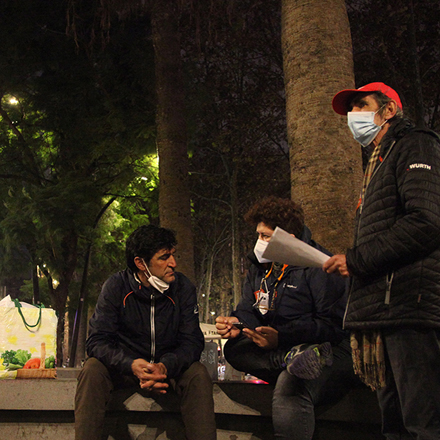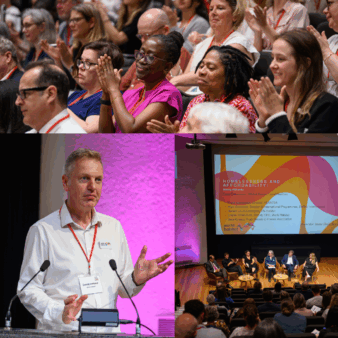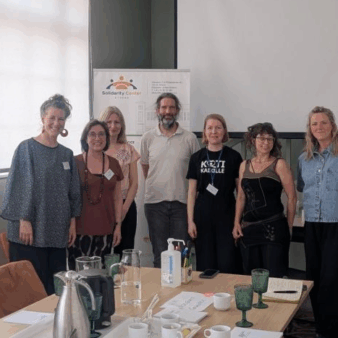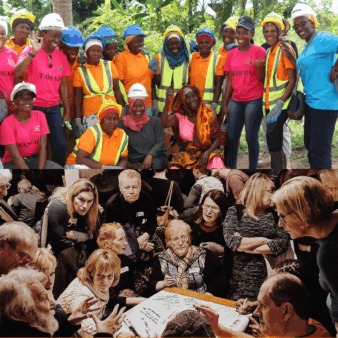
Celeste Sangster, from our European End Street Homelessness Campaign, looks at why people who are without homes across Europe should be prioritised for a COVID-19 vaccination and helped into secure homes.
Hopes of curbing COVID-19 – saving lives and loosening lockdown restrictions – have been placed on the coronavirus vaccines. But who has access to it, and are the most exposed receiving it first?
We know that people experiencing homelessness are particularly at risk. Data from across our European End Street Homelessness Campaign has shown that people sleeping outside are likely to suffer existing health conditions, making the impacts of the virus more severe, and that many have been unable to access safe accommodation to self-isolate during the pandemic.
More than four in every five (83%) people sleeping on the streets in Barcelona have not accessed the municipality’s emergency accommodation – which opened at the end of March 2020.
More than one-in-four (28.7%) people experiencing street homelessness in Brussels report living with chronic health conditions.
I spoke to some of our European End Street Homelessness Campaign partners and friends to find out what the situation is on their city’s streets.
In Bratislava, the Slovakian capital – where up to 4,000 people may be sleeping outside at any point – social workers and street outreach workers were amongst the first to receive the vaccine. During the first wave of the virus no-one in the homeless community had knowingly contracted the virus, but recently more than 50 people who are street homeless have tested positive – including some with the highly transmissible ‘UK variant.’
Our European End Street Homelessness Campaign partners OZ STOPA and OZ PRIMA have been working tirelessly to protect those experiencing homelessness and support them to receive the vaccine. Government vaccination teams are accompanying their street outreach workers, to administer it in-situ, as for many, traditional appointments are difficult to access due to lack of ID cards or mobile phones to make contact. Worryingly though, as more and more people experiencing homelessness are testing positive for COVID-19, they are starting to lose out. New government rules mean that those who have tested positive for the virus are not eligible for the vaccine.
The United Kingdom is currently making good progress with its vaccination programme – having administered the most first jabs in total, as well as the highest number per capita of all European countries. Importantly, whilst residents of care homes and frontline health and social care workers are considered as the highest priority group, those experiencing homelessness and homelessness workers have not been identified as part of this tier – despite being at higher clinical risk of severe disease and increased risk of exposure and transmission.
I spoke to Caroline Bernard, Head of Policy and Communications at Homeless Link, a national membership charity for organisations working directly with people who become homeless in England, who told me:
“We continue to consult our members all over England to understand how many staff and clients have been vaccinated. The majority of organisations seem to have had contact with their local authorities to nominate frontline staff for the vaccinations, and in many cases these vaccinations have taken place. However, there are some members who have not been contacted and we will be supporting them to make the case to their local authorities.
“We know of a handful of local authorities who have made special efforts to vaccinate people without homes, including Liverpool, Oldham and Redbridge. We are concerned that many people who do not have secure housing also have severe clinical needs – but have not been diagnosed as such because they are not registered with a GP. Our priority is to help them to register with a GP and make sure that they therefore gain access to vaccination and all other healthcare support.
“People without homes are extremely vulnerable and suffer from multiple disadvantage. They often have complex health needs and are disconnected from support systems. Giving the homeless population access to vaccines will save lives and help set many people onto the road for long-term secure housing. The frontline staff working in the homeless sector should of course be a priority – like all other care workers – whilst they support their clients to stay off the streets and stay safe.”
Over the last year in European End Street Homelessness Campaign city Leicester – which has experienced the longest running lockdown restrictions of any UK city – the Leicester Homelessness Charter has brought together homelessness organisations and health partners to work closely and ensure that people sleeping on the streets have access to both testing and treatment. Their cohesive approach has already shown huge success.
Mark Grant from Action Homeless, told me about the progress they’re making there.
“Inclusion Healthcare, the homeless primary care service in the City, made a request to the local Primary Care Networks on behalf of the Homeless Partnership [the Leicester Homelessness Charter] asking that homeless hostels be treated the same as care homes, which they agreed to.
“On Wednesday 3 February, the Oxford AstraZeneca vaccine was used to vaccinate 36 hostel patients, just over half of those eligible, and 20 medical high priority non-hostel patients, across three Leicester hostels.”
Unfortunately, the picture is not so encouraging elsewhere. In Barcelona, no specific COVID-19 screening plans for people sleeping on the streets have been implemented, nor have street outreach teams been reinforced by health professionals. According to data collected by our lead campaign partner Arrels Fundació, just over half of those who accessed emergency accommodation since March were able to access COVID-19 tests – a figure that should be much higher, given the high risk of transmission in shared accommodation. Arrels is now calling for people experiencing homelessness to be prioritised as a high-risk group.
What is clear is that access to the vaccine is not equal – between countries or within them. During this pandemic, those sleeping on the streets have been amongst the most exposed – unable to protect themselves at home by following basic hygiene guidance and adhering to social distancing, and less able to access testing, treatment, and now prevention. We must make sure that people experiencing street homelessness are not only treated as a priority group for the vaccination but also given emergency accommodation and then helped into more secure homes. It’s imperative that we work together to support people off the streets and into homes, and to prevent them from returning.
To find out more about the incredible work taking place to end street homelessness across Europe, sign up to our campaign e-bulletin.
Image: Sandra Ballcells




Join the discussion